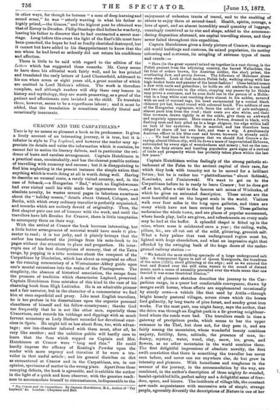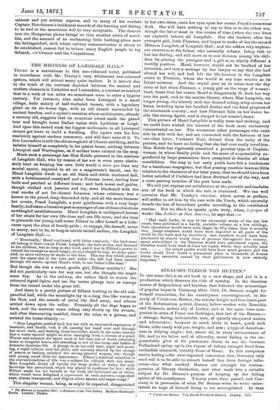CRACOW AND THE CARPATHIANS.*
THIS is by no means so pleasant a book as its predecessor. It gives a lively account of an interesting journey, it is true, but it is inferior in style to Try Lapland, and however the reader may ap- preciate its details and value the information which it contains, he cannot fail to notice its literary defects, and in particular the evi- dence of haste and careless arrangement. Captain Hutchinson is a practical man, unmistakably, and has the clearest possible notions of travelling with economy and success ; but it is disappointing to find him neglecting in the present instance the simple axiom that anything which is worth doing at all is worth doing well. Having to describe an unusual route, a rarely visited country, and, in the case of Schtnek,—a Hungarian "Bad," which no Englishwoman had ever visited until his wife made her appearance there,—an absolute novelty, he wastes several pages in laborious smartness about the "holiday season," details about Ostend, Cologne, and Berlin, with which every ordinary traveller is perfectly acquainted, and remarks which are entirely devoid of originality. Thus, the first chapter puts one out of humour with the work, and until the travellers have left Breslau for Cracow, there is little temptation to accompany them on their way.
With the arrival at Cracow the book becomes interesting, but a little better arrangement of material would have made it plea- santer to read ; it is too jerky, and it plainly betrays that the author has transferred the jottings from his note-book to its pages without due attention to place and proportion. He inter- rupts one of his best descriptions of scenery, that of the Tatra range, by popping in a trite sentence about the conquest of the Carpathians by Diocletian, which has about as congenial an effect as the running commentary of a Westminster-Abbey guide upon one's mental excursions into the realm of the Plantagenets. The simplicity, the absence of historical association, the escape from the pressure of tradition which characterise Lapland, preserved Captain Hutchinson from mistakes of this kind in the case of his charming book from High Latitudes. He is an admirable pioneer and a fair narrator, but in the character of a commentator we find him at once superficial and prosy. Like most English travellers, he is too profuse in his dissertations upon the superior personal cleanliness of himself and his fellow-countrymen ; thanks God too frequently that he is not like other men, especially these Cracovians, and records his tubbings and clippings with as much fervent monotony as Lady Herbert recorded her devotional exer- cises in Spain. He might tell us less about fleas, too, with advan- tage; one inn-chamber infested with them must, after all, be very like another ; and the unbitten public will hardly care to learn that the fleas which supped on Captain and Mrs. Hutchinson at Cracow were "long and thin." lie could hardly impress the efficacy of Keating's Powder upon the reader with more urgency and iteration if he were a tra- veller in that useful article ; and his general diatribes on dirt as encountered at Cracow and in the Carpathians, are, in our opinion, specimens of matter in the wrong place. Apart from these annoying defects, the book is agreeable, and it exhibits the author in the light of a quick and keen observer, with the genuine readi- ness to accommodate himself to circumstances, indispensable to the
• Try Cracow and the Carpathian,. By Captain Hutchinson, ILA., Author of "Try Lapland," &c. London: Chapman and Hall.
enjoyment of unbeaten tracts of travel, and to the enabling of others to enjoy them at second-hand. Health, spirits, courage, a love of sport, and an almost incredibly small quantity of luggage, cunningly contrived as to size and shape, added to the accommo- dating disposition aforesaid, are capital travelling stores, and they never failed throughout this expedition.
Captain Hutchinson gives a lively picture of Cracow, its strange old-world buildings and customs, its mixed population, its motley colouring and costumes, its mingling of extreme types of races and creeds
Here (in the great square) mixed up together in a vast throng, is the Polish peasant from the adjoining country, the furred Wallachian, the fat friar of orders brown, the Austrian soldier, the sleeh priest, the everlasting Jew, and pretty Jewess. The followers of Mahomet alone were absent. Look at that modern Polish lady, walking along with her high-heeled boots and pannier of the latest fashion ! Close behind comes a Jew with curls and gabardine; he holds an old umbrella in one hand and two old waistcoats in the other, stopping any passer-by he thinks may prove a customer, and he soon finds one in the person of a Molda- vian in a long white coat reaching down almost to his ankles, covered with no end of worsted tags, his head surmounted by a conical black chimney pot hat, bound round with coloured braid. Two soldiers of One of the Hungarian regiments, with faces the colour of pale mahogany, almost push him from the road ; their coats are also white, and their blue trowsers. drawn tightly in at the ankle, give them an awkward and ungainly appearance. Here comes a Jewess, dressed in black, with flashing eyes and hair piled up in a large chignon, the edge within half an inch of her eyebrows. She is married, and has therefore been obliged to shave off her own hair, and wear a wig. A gentlemanly Austrian officer in his blue coat and brown trowsers is already satin. . . . . We had been led to suppose that we should find Cracow a de- caying, almost lifeless city, with its Jews a mass of impoverished Hebrews, surrounded by every sign of wretchedness and misery ; but on the con- trary, the busy streets and bustling population gave signs of a revival of trade and prosperity which has probably taken place within the last few years."
Captain Hutchinson writes feelingly of the strong pathetic ats tachinent of the Poles to the ancient capital of their race, for which they look with tenacity not to be moved for a brilliant future ; but be is rather too " platitudinarian " about Sobieski, Kosciusko, and Poniatowski. We want to get on to the Carpathians before he is ready to leave Cracow ; but be does get off at last, after a visit to the famous salt mines of 1Vieliczka, of which he gives an animated description. These mines are the most beautiful and on the largest scale in the world. Visitors walk over four miles in the lung open galleries, and there are many which have not been entered for years. These galleries undermine the whole town, and are places of popular amusement,
where bands play, balls are given, and refreshments on every scale may be had at the buffet. A splendid chapel is fitted up in the mine, where mass is celebrated once a year ; the ceiling, walls, pillars, &es are all cut out of the solid, glittering, greenish salt. What a fairy palace that vast underground region must be, lighted with huge chandeliers, and what an impressive sight that afforded by the swinging back of the huge doors of the under- ground railway station :— " We beheld the most striking spectacle of a large underground sal.t lake. A transparent figure in salt of Queen Kunigunda, the foundress of the mine (l25'1), stood glittering at the edge ; and as we entered the boat and floated over the still calm waters to the sound of distant music, such a sense of unreality prevailed over the whole scene that one fancied it was some theatrical illusion."
A series of pleasant sketches describes the journey to the Car- pathian range, in a queer but comfortable conveyance, drawn by meagre swift horses, whose efforts are supplemented occasionally by sturdy cows—a vehicle like that used by Attila—through bright homely pastoral villages, across rivers which the horses ford gallantly, by long tracts of pine forest, and sundry great iron works. For the most part, one might fancy, says the author, that the drive was through an English park in a fir-growing neighbour- hood where the roads were bad. The travellers reach in time a. gateway of precipitous peaks, which seems to bar the upper entrance to the Thal, but does not, for they pass it, and are fairly among the mountains, whose wonderful beauty combines majesty, fertility, form, solitude, the presence of man, in- dustry, mystery, water, wood, clay, snow, ice, grass, and flowers, as no other mountains in the world combine them. The first delightful impressions of absolute novelty, the first swift conviction that there is something the traveller has never seen before, and never can see anywhere else, do but grow in intensity and pleasure. With homeliness and roughness in the manner of the journey, in the accommodation by the way, are combined, in the author's description of these mighty fir-wooded, hamlet-sprinkled hills, perfect safety and a delightful sense of free- dom, space, and leisure. The incidents of village life, the constant new-made acquaintance with successive sets of simple, strange people, agreeably diversify the descriptions of Nature is one of her calmest and yet noblest aspects, and to many of his readers . Captain Hutchinson's incidental records of the hunting and fishing - to be had in the mountains will be very acceptable. The descent into the Hungarian plains brings us into another series of novel- I ties, and the account of an enchanting little bathing-place near the Schlagendorf, with which railway communication is about to - be established, cannot fail to induce many English people to try Schmek, via Cracow and the Carpathians.



































 Previous page
Previous page